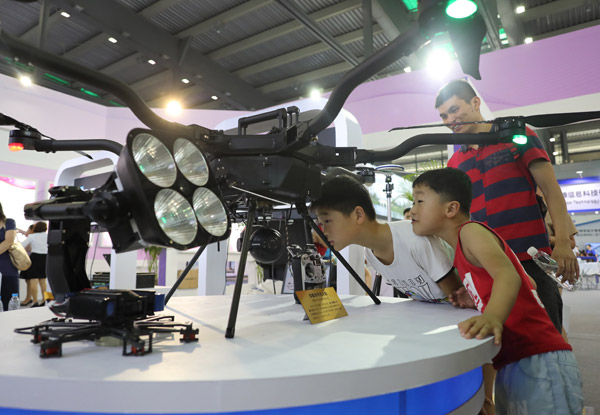
Children take a close look at an industrial drone at the 2017 World Internet of Things Wuxi Summit on Sept 10, 2017. (Photo by GAO ERQIANG/CHINA DAILY)
Telecom giants spending resources to make tiny links that will aid businesses
Driving in a metropolis is never easy, but finding an open space can be more difficult in Chinese cities given that over half the demand for parking lots is not satisfied.
Thanks to the development of internet of things technology, drivers in Shanghai, however, are having an easier time. A driver can use an app to find an empty space in a parking lot, navigate to the location and pay the bill with a smartphone. Moreover, the app can calculate the probability of a space becoming empty by using information from the likes of parking ticket machines.
The pilot project is being conducted by China United Network Communications Group Co Ltd, or China Unicom, the country's second-largest mobile carrier, and leading telecom equipment maker Huawei Technologies Co Ltd, in the Minhang district of Shanghai.
It is part of China's broader push to gain a lead in the race toward the era of IoT, with the global market value of such subsystems-in equipment and internet-connected things-projected to surpass $100 billion in 2018, according to Luo Wen, vice-minister of the Ministry of Industry and Information Technology, the top industry regulator in China.
"Developing the internet of things is a strategic move to nurture a new momentum in China's economy," Luo told the 2017 World Internet of Things Wuxi Summit on Sunday.
IoT is the concept of connecting any electronic device to the internet such as cellphones, coffee makers, washing machines, headphones and other wearable devices to streamline management and enhance efficiency.
He said that, bolstered by the government's Made in China 2025 and Internet Plus initiatives, China has made strides in building the IoT's infrastructure, commercial applications and technology advancements such as the narrow-band IoT, a radio technology which can connect billions of devices in a smarter way than WiFi and Bluetooth.
China is in driver's seat
The market size of China's IoT industry is expected to exceed 1.5 trillion yuan ($231.4 billion) in 2020, up from over 900 billion yuan in 2016, the China Annual IoT Development Report (2016-2017) forecast.
Favorable government policies and fierce market competition inside the world's largest manufacturing powerhouse of electronics have already placed China in the driver's seat in IoT adoption, according to Charlie Dai, principal analyst at consultancy Forrester.
"First, the government places great value on strategic IoT initiatives for the nation's digital transformation, having inked IoT into its 13th Five-Year Plan, which steers China's economic and social development between 2016 and 2020," Dai said.
To be more specific, the Ministry of Industry and Information Technology unveiled a plan earlier this year to boost development of IoT, with the goal of enabling more than 1.7 billion public machine-to-machine connections by 2020. There were 100 million connections in 2015, accounting for 31 percent of all global connections, official data show.
Beijing also selected a host of cities to pilot the smart city projects, through which they established database and sensor networks to collect, store, and analyze information related to transportation, electricity, public safety and environmental factors.
For example, in the city of Wuxi, a government-backed heartland for IoT adoption, the number of IoT-connected gadgets by the end of August had for the first time surpassed that of mobile subscribers, said Li Qiang, Party secretary of the Communist Party of China Jiangsu provincial committee.
"This is thanks to the full coverage of China's narrow band IoT network four months ago across the city," Li said. This marked another technical breakthrough that Wuxi has made since the city built the nation's first high-standard all-optical network.
An IoT demonstration zone is also established in Wuxi's Xuelang town, co-developed by the municipal government and tech giant Alibaba Group, to create synergies for the country's wealthy Yangtze River Delta Region to push ahead with IoT technologies, he added.
The other driver is the competitive market in China, said Dai from Forrester, so firms in sectors from manufacturing to services have the impetus to improve product performance, better differentiate themselves from peers by using IoT technologies.


















































